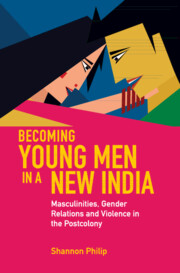Book contents
- Frontmatter
- Contents
- List of Figures
- Note on Terms and Translations
- Acknowledgements
- Introduction: Young Men in a Neoliberal India
- 1 Becoming a ‘New’ Indian Man
- 2 Making Masculine Bodies
- 3 Desexing Men and Hypersexing Women
- 4 Urbanisation and the Gendering of a Smart City
- 5 Men’s Violence and Women’s Safety
- Conclusion: Fragilities of a New Indian Man
- Appendix: Urban Smart Striver Profiles
- References
- Index
Appendix: Urban Smart Striver Profiles
Published online by Cambridge University Press: 31 March 2022
- Frontmatter
- Contents
- List of Figures
- Note on Terms and Translations
- Acknowledgements
- Introduction: Young Men in a Neoliberal India
- 1 Becoming a ‘New’ Indian Man
- 2 Making Masculine Bodies
- 3 Desexing Men and Hypersexing Women
- 4 Urbanisation and the Gendering of a Smart City
- 5 Men’s Violence and Women’s Safety
- Conclusion: Fragilities of a New Indian Man
- Appendix: Urban Smart Striver Profiles
- References
- Index
Summary
Raj: Raj was studying information technology (IT) in South Extension when we first met at the cigarette stall. He was 24 years of age and had previously dropped out of a graphics design course to now start his current IT training at a private college. His family paid for this degree, which he told me costed ‘almost one lakh’ a year (£1,000). His father was an administrator for a large construction firm and had an ‘office job’. Towards the end of my fieldwork, Raj too had joined his father's employer and used to go to ‘office’ in the morning with his dad. He had an older sister who was married and hence not living at home. Being the only son, he often got a lot of privileges and expense money.
Aditya: I met Aditya through Raj. They were friends from their English medium school in South Delhi, where they were classmates. Aditya too started the graphics design course with Raj, but unlike Raj, he continued to complete his studies. When I met Aditya, he was about to start a ‘masters’ in graphics at a private institute and in his spare time he worked as an ‘Events Manager’ for a company called West Wind Productions. Aditya's college was also in South Extension, and so we would often meet at the cigarette stall because it was convenient for all. His mother was a housewife and his dad was a mid-level government worker at the Delhi Water Board. His parents were very generous to all of Aditya's friends and we would often hang around his house.
Rahul: Rahul was 26 years of age and became a close friend during the time of my fieldwork. He was desperately searching for a stable job for over a year but had not managed to find anything suitable. He was considering a move to the ‘hospitality’ industry, away from his education in marketing and communications because he felt there were more jobs in the hospitality sector. We met at Connaught Place having a cigarette; he had clocked me on his ‘gaydar’, he explained, and this became a source of great jokes and jest amongst us. He had a tough relationship with his family and often fought with them. But because he lived at home, he had to be careful not to irritate them too much.
- Type
- Chapter
- Information
- Becoming Young Men in a New IndiaMasculinities, Gender Relations and Violence in the Postcolony, pp. 172 - 174Publisher: Cambridge University PressPrint publication year: 2022

